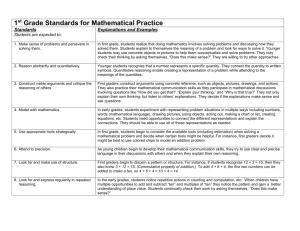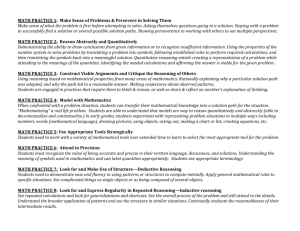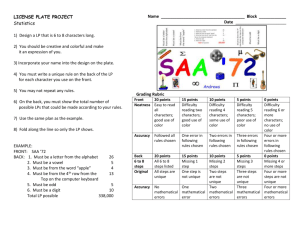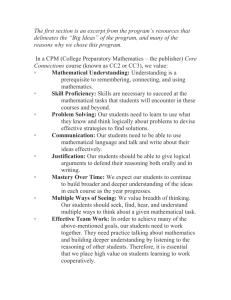signatures mathematical
advertisement
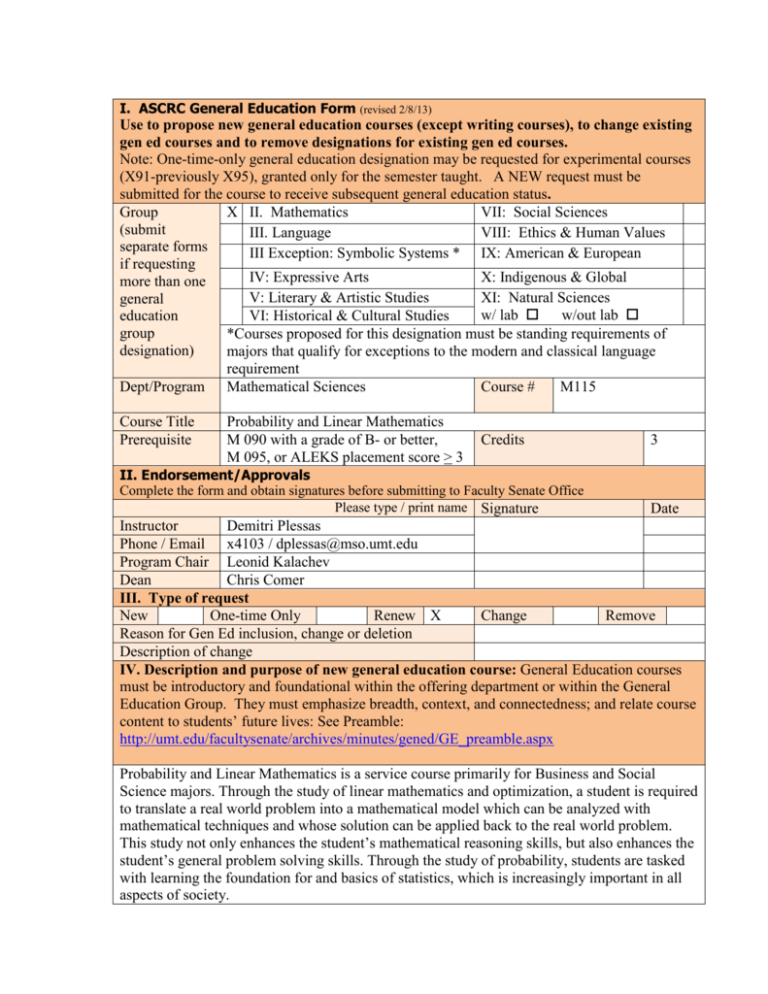
I. ASCRC General Education Form (revised 2/8/13) Use to propose new general education courses (except writing courses), to change existing gen ed courses and to remove designations for existing gen ed courses. Note: One-time-only general education designation may be requested for experimental courses (X91-previously X95), granted only for the semester taught. A NEW request must be submitted for the course to receive subsequent general education status. Group X II. Mathematics VII: Social Sciences (submit III. Language VIII: Ethics & Human Values separate forms III Exception: Symbolic Systems * IX: American & European if requesting IV: Expressive Arts X: Indigenous & Global more than one V: Literary & Artistic Studies XI: Natural Sciences general w/ lab w/out lab education VI: Historical & Cultural Studies group *Courses proposed for this designation must be standing requirements of designation) majors that qualify for exceptions to the modern and classical language requirement Dept/Program Mathematical Sciences Course # M115 Course Title Prerequisite Probability and Linear Mathematics M 090 with a grade of B- or better, M 095, or ALEKS placement score > 3 Credits 3 II. Endorsement/Approvals Complete the form and obtain signatures before submitting to Faculty Senate Office Please type / print name Signature Date Instructor Demitri Plessas Phone / Email x4103 / dplessas@mso.umt.edu Program Chair Leonid Kalachev Dean Chris Comer III. Type of request New One-time Only Renew X Change Remove Reason for Gen Ed inclusion, change or deletion Description of change IV. Description and purpose of new general education course: General Education courses must be introductory and foundational within the offering department or within the General Education Group. They must emphasize breadth, context, and connectedness; and relate course content to students’ future lives: See Preamble: http://umt.edu/facultysenate/archives/minutes/gened/GE_preamble.aspx Probability and Linear Mathematics is a service course primarily for Business and Social Science majors. Through the study of linear mathematics and optimization, a student is required to translate a real world problem into a mathematical model which can be analyzed with mathematical techniques and whose solution can be applied back to the real world problem. This study not only enhances the student’s mathematical reasoning skills, but also enhances the student’s general problem solving skills. Through the study of probability, students are tasked with learning the foundation for and basics of statistics, which is increasingly important in all aspects of society. V. Criteria: Briefly explain how this course meets the criteria for the group. See: http://umt.edu/facultysenate/documents/forms/GE_Criteria5-1-08.aspx Any course which satisfies the mathematical Probability and Linear Mathematics is a course in applying mathematical reasoning literacy requirement must have as its to problems in business and science. primary goal to teach mathematical Students are tasked with using mathematical reasoning and problem solving at a college reasoning drawing on techniques from linear level. Department of Mathematical Sciences algebra, linear programming, probability approval is required. theory, and statistics to analyze real world problems. The focus of the course is on real world problems with an emphasis on techniques to help the student precisely formulate the problem mathematically and to interpret solutions. VI. Student Learning Goals: Briefly explain how this course will meet the applicable learning goals. See: http://umt.edu/facultysenate/documents/forms/GE_Criteria5-1-08.aspx Upon completion of the mathematical literacy After competition of this course, a student will be able to use mathematical techniques requirement, a student will be able to and reasoning to model logistical, business, effectively apply mathematical or statistical and nutritional problems as a system of reasoning to a variety of applied or equations, solve two-variable optimization theoretical problems. problems in business, science, and economics, perform probabilistic analysis of common chance situations, perform analysis of the expected payout of insurance policies and games of chance, and perform elementary statistical analysis. We also require that the analysis of a problem end with the correct interpretation of the mathematical solution in the real world setting. VII. Justification: Normally, general education courses will not carry pre-requisites, will carry at least 3 credits, and will be numbered at the 100-200 level. If the course has more than one pre-requisite, carries fewer than three credits, or is upper division (numbered above the 200 level), provide rationale for exception(s). VIII. Syllabus: Paste syllabus below or attach and send digital copy with form. The syllabus should clearly describe how the above criteria are satisfied. For assistance on syllabus preparation see: http://teaching.berkeley.edu/bgd/syllabus.html Attached as a digital copy. Please note: Approved general education changes will take effect next fall. General education instructors will be expected to provide sample assessment items and corresponding responses to the Assessment Advisory Committee.
